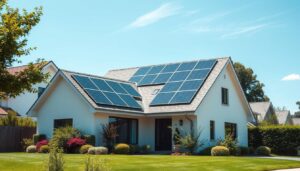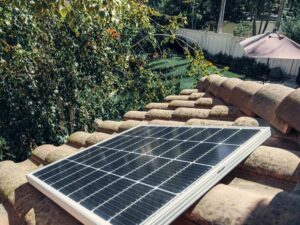Are you ready to explore the benefits of solar energy for your business?
Navigating the complexities of commercial solar systems may seem overwhelming at first glance, but fear not – with the right guidance, you can unlock the potential of sustainable energy solutions that align with your business goals.
From understanding system sizing to maximizing cost-efficiency, this beginner’s guide will provide you with the foundational knowledge to kickstart your journey towards a greener and more financially sound future.
Stay tuned to uncover the key insights that will empower you to make informed decisions regarding solar implementation for your business.
Key Takeaways
- Commercial solar systems require careful consideration of size, hardware, permissions, and installation expertise.
- Financing options like loans, leases, and PPAs are available with detailed contracts outlining warranties and maintenance.
- Regular monitoring and maintenance are essential for optimal system performance and longevity.
- Rebates, designs, and contract terms play a crucial role in the successful installation and operation of commercial solar systems.
Commercial Solar System Considerations
When considering a commercial solar system, it’s crucial to assess the hardware requirements based on the system’s size and eligibility for subsidies and permissions. Grid connection plays a vital role, especially for systems between 30-100 kW that require specific permissions.
For systems exceeding 250 kW, specialized installer qualifications are necessary to ensure proper installation and performance. By addressing these key factors, such as grid connection and installer qualifications, you can guarantee a smooth and efficient setup for your commercial solar system.
Make informed decisions to maximize the benefits of your system while complying with regulations and optimizing energy production. Remember, choosing the right hardware and qualified installers is fundamental to the success of your commercial solar project.
Commercial Solar Costs and Financing
To effectively manage the financial aspect of your commercial solar project, understanding the costs and financing options is essential. Commercial solar power installation costs typically range from $1,000 to $1,300 per kW. It’s important to note that additional expenses for microinverters or power optimizers can augment total costs by 15-20%.
When considering financing options, you have choices such as loans, leases, and power purchase agreements. Ensure that your contracts clearly outline warranties, maintenance agreements, and performance guarantees to protect your investment.
Monitoring and Maintenance of Solar Systems
Implementing regular monitoring and maintenance practices is essential for ensuring the optimal performance and longevity of your commercial solar system. Real-time performance monitoring software provides crucial data to track your system’s efficiency.
Assigning someone to monitor the system’s generation ensures a quick response to any issues. Additionally, following cleaning schedules recommended by installers helps maintain peak efficiency by ensuring panels are free from dirt and debris.
By adhering to these practices, you can maximize the benefits of your investment and extend the lifespan of your commercial solar system.
| Monitoring and Maintenance | Benefits |
|---|---|
| Real-time performance monitoring software | Tracks system efficiency |
| Assigning someone to monitor generation | Quick issue response |
| Cleaning schedules | Maintains peak efficiency |
Commercial Solar Rebates and Designs
For optimal financial benefits and efficient design planning, understanding commercial solar rebates and designs is crucial for your business’s solar investment.
When considering commercial solar, weight considerations play a significant role, especially for roof-mounted arrays. Ensuring that your roof can handle the weight of the solar system is essential for a successful installation. In cases where roofs are unsuitable, ground mount systems provide a viable alternative.
Before installation, detailed roof plans should be reviewed to determine the best design approach. By carefully considering weight limitations and exploring ground mounts where necessary, you can ensure that your commercial solar system is installed safely and effectively, maximizing its performance and longevity.
Commercial Solar Contracts and Installation
Understanding the legal aspects and technical requirements of commercial solar contracts and installations is essential for ensuring a successful and compliant transition into solar energy for your business. When engaging in contract negotiations, ensure compliance with Australian Consumer Law and thoroughly review all terms and responsibilities. During the installation process, consider different types of inverters available for commercial systems to optimize performance. Initial consultations should involve an analysis of your energy profile and a review of your billing structure. Calculating the Internal Rate of Return (IRR) is crucial for evaluating the financial viability of your solar investment. Take the time to familiarize yourself with the installation process to guarantee a smooth transition to solar energy for your business.
| Contract Negotiations | Installation Process | Inverter Types |
|---|---|---|
| Comply with legal laws | Review installation plans | Evaluate performance |
| Define responsibilities | Coordinate with installers | Optimize system output |
| Ensure warranty coverage | Monitor installation progress | Choose based on system size |
Essential Steps for Solar Implementation
To kickstart your solar journey, prioritize an efficient system design tailored to your business needs. Before diving into solar implementation, follow these essential steps:
- Site Assessment: Conduct a thorough evaluation of your property to determine the best location for solar panel installation.
- Energy Audit: Assess your current energy consumption patterns to accurately size your solar system for optimal efficiency.
- Consult with Experts: Engage with solar professionals to guide you through the design and implementation process.
- Permitting and Approvals: Obtain necessary permits and approvals from local authorities to ensure compliance with regulations and grid connection requirements.
Frequently Asked Questions
Can Businesses Receive Tax Incentives or Credits for Installing a Commercial Solar System?
Businesses can benefit from tax incentives and financial benefits when installing commercial solar systems. These incentives can include rebates such as STCs and LGCs, making solar power a cost-effective and sustainable choice for businesses.
Are There Any Specific Insurance Requirements for Commercial Solar Systems?
When setting up your commercial solar system, remember insurance coverage safeguards against potential risks. During the installation process, ensure installers have appropriate coverage. Protect your investment with comprehensive insurance that covers all aspects.
How Can Businesses Ensure the Longevity and Efficiency of Their Commercial Solar System?
To ensure the longevity and efficiency of your commercial solar system, follow these maintenance tips: regular monitoring, cleaning panels, checking components, and assigning someone to monitor generation. Utilize monitoring software for real-time data.
What Are the Potential Challenges or Obstacles Businesses May Face When Obtaining Grid Connection Permissions for Their Solar System?
When obtaining grid connection permissions for your solar system, you might face permitting challenges and grid connection delays. Ensure thorough documentation and compliance to expedite the process. Consulting with specialists can help navigate these obstacles efficiently.
Are There Any Specific Regulations or Requirements for Businesses Looking to Incorporate Energy Storage Solutions With Their Commercial Solar System?
When considering energy storage integration with your commercial solar system, regulatory compliance is crucial. Ensure adherence to relevant guidelines. Seek expert advice for optimal design and implementation. Meeting requirements guarantees system efficiency and longevity.
Conclusion
In conclusion, investing in a commercial solar system for your business is a smart decision that can lead to cost savings, energy independence, and environmental benefits.
By understanding system requirements, financing options, monitoring, maintenance, rebates, designs, contracts, and installation processes, you can successfully implement a solar solution tailored to your business needs.
Take the essential steps outlined in this guide to embark on a sustainable energy journey that will benefit both your bottom line and the planet.



